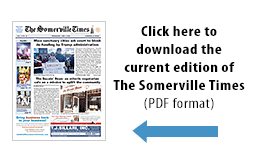
The Somerville City Council was updated on the preliminary results of the Safety for All Survey at their most recent meeting
By Jim Clark
At the latest regular meeting of the Somerville City Council on Thursday, November 21, the Di-rector of the Department of Racial and Social Justice (DRSJ), Denise Molina Capers, reviewed the findings and gave a broad overview of the department’s Public Safety for All survey, touching on several areas.
The Director noted that this survey was one of the most representative surveys undertaken in the city and had a total of 1,296 responses. The surveying period ran from September 2022 to March 2023. A community outreach strategy was developed intentionally focused on vulnerable populations which are most impacted by social injustices.
Outreach for the survey was begun in September 2022. It was promoted at ward meetings, community meetings, farmers markets and other city events.
According to Molina Capers, the survey consisted of three separate sections: safety, encounters with police, and perceptions of police. Canvassing, door-knocking, emails, text messages, robo-calls, and one-on-one interviews were also conducted, as well as on social media.
Nine city departments worked with the DRSJ, along with 36 community partners, and 23 focus groups were conducted reaching 144 constituents.
A prepared presentation was presented at the Council meeting, reviewing various finding from the survey.
Councilor At-Large Willie Burnley, Jr. commented that the structure of the presentation did not deal with how to improve safety, nor provide alternatives to policing and he asked if all of the comments would be shared. Director Molina Capers replied that they may be added as an appendix. Councilor Burnley asked why data for disabled and LGBTQIA people was combined for some areas and not others and was told that the reason this was done was because of the number of respondents.
Councilor At-Large Charlotte Kelly asked when the open data platform would be available to the public and SomerStat Director Anna Gartsman replied that it is available now. Director Gartsman noted that open comments have been excluded to protect identities.
Councilor Kelly also commented about the survey being open to people who worked in the city, and she inquired about various datasets that might extrapolate particular groups. She was told that analysis is possible at various levels and could be provided upon request.
To collect the survey data, focus groups were held and collaboration was conducted with the Office of Immigrant Affairs and multiple community organizations.
Ward 5 Councilor Beatriz Gomez Mouakad emphasized finding ways to reach out to non-English speaking people.
With regard to improvements to the Police Department, Director Molina Capers stated that it was important to report the differences by race so the voices of those most impacted could be heard.
Ward 6 Councilor Lance Davis commented that it wasn’t clear how the data supports the perceptions and Director Molina Capers replied that part of the answer is history, and that people of color are most impacted because some areas need to be patrolled more than others due to higher crime.
Director Molina Capers closed by saying that the full report would be available in early 2024 and that the task force would appreciate feedback from the Councilors.















Reader Comments